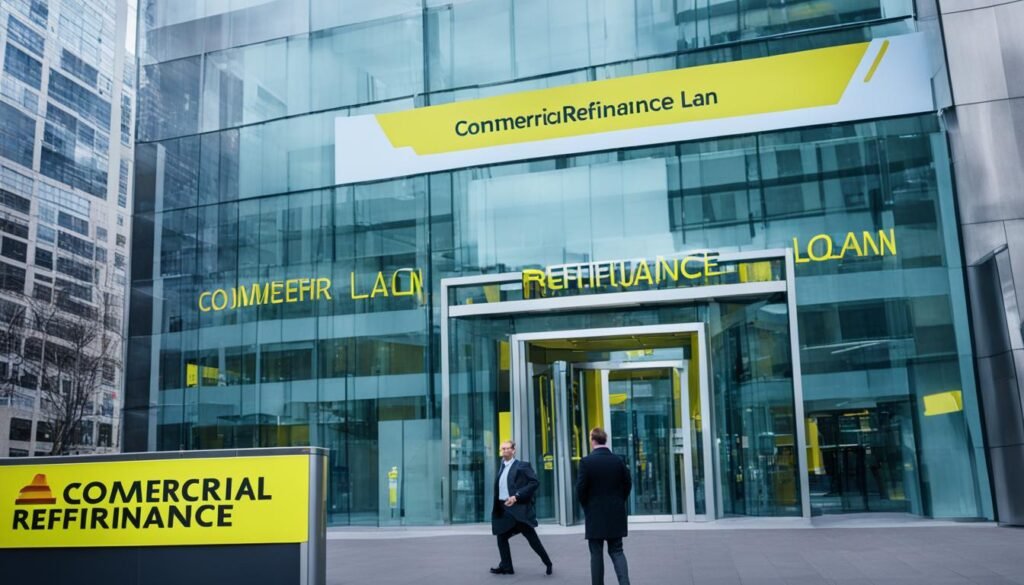In today’s dynamic business landscape, access to capital is crucial for enterprises seeking to expand, innovate, and seize new growth opportunities. Commercial loans have emerged as a vital financial tool, providing businesses with the resources they need to fuel their ambitions. These specialized loan products, offered by banks, credit unions, and specialized lenders, are designed to cater to the unique needs and requirements of commercial enterprises.
Unlike personal loans, commercial loans are tailored to address the specific financing needs of businesses, whether it’s expanding facilities, purchasing equipment, or managing working capital. With flexible terms, competitive interest rates, and higher loan amounts, these financial solutions can unlock a world of possibilities for savvy business owners and entrepreneurs.
Key Takeaways
- Commercial loans are financial products designed specifically for businesses to fund various operational needs.
- These loans offer flexible terms, competitive interest rates, and higher loan amounts compared to personal loans.
- Commercial loans can be used for a variety of purposes, including expanding facilities, purchasing equipment, and financing working capital.
- Businesses can access commercial loans from banks, credit unions, and specialized financial institutions.
- Understanding the different types of commercial loans and their features can help businesses choose the right financing solution for their growth plans.
Introduction to Commercial Loans
In the world of business financing, commercial loans have emerged as a vital tool for enterprises seeking to fuel their growth and expansion. These specialized financial products, offered by banks, credit unions, and specialized lenders, cater specifically to the needs of businesses, providing them with the capital they require to navigate various operational challenges and seize new opportunities.
What are Commercial Loans?
Commercial loans are financing solutions designed to address the unique financial requirements of businesses, ranging from small startups to large corporations. Unlike personal loans, which are tailored for individual borrowers, commercial loans focus on meeting the needs of commercial entities, offering flexible terms, competitive interest rates, and higher loan amounts. These loans can be used for a variety of purposes, such as expanding facilities, purchasing equipment, financing working capital, or even refinancing existing debt.
Importance of Commercial Loans for Business Growth
The importance of commercial loans in fueling business growth cannot be overstated. These financing options provide businesses with the necessary capital to invest in their future, whether it’s expanding their operations, investing in innovative technologies, or seizing new market opportunities. By granting access to additional funds, commercial loans empower businesses to take calculated risks, strengthen their competitive edge, and ultimately drive long-term success.
Types of Commercial Loans

The commercial loan landscape in the United States offers a diverse array of options to cater to the unique needs of businesses. From term loans and lines of credit to SBA loans and equipment financing, each type of commercial loan has its own distinct features and applications. Understanding these various loan products can help entrepreneurs and business owners make informed decisions when seeking the right commercial loan to fuel their commercial real estate investments, business growth, and operational financing.
Term Loans
Term loans are a popular choice among businesses seeking a lump-sum loan with a predetermined repayment schedule. These loans typically offer fixed interest rates and loan terms ranging from one to 25 years, making them well-suited for financing major purchases, commercial real estate acquisitions, or long-term business expansion projects. Term loans can provide businesses with the necessary capital to invest in growth opportunities while offering a structured repayment plan.
Lines of Credit
In contrast to term loans, lines of credit offer businesses more flexibility in managing their cash flow and working capital needs. These revolving credit facilities allow businesses to access funds as needed, up to a pre-approved loan amount, and only pay interest on the amount they actually borrow. Lines of credit can be particularly useful for covering short-term expenses, meeting seasonal financing requirements, or bridging gaps in cash flow.
SBA Loans
The Small Business Administration (SBA) offers a range of loan programs designed to support small and medium-sized businesses. SBA loans typically feature lower interest rates, longer repayment terms, and more flexible eligibility criteria compared to traditional bank commercial loans. These government-backed financing options can be particularly beneficial for businesses that may not qualify for conventional commercial lending or need additional capital to grow their operations.
Equipment Financing
Equipment financing is a specialized type of commercial loan that allows businesses to acquire new or used equipment, such as machinery, vehicles, or technology, through a loan or lease arrangement. This type of financing can be advantageous for businesses in the commercial construction, manufacturing, or transportation industries, as it enables them to obtain the necessary equipment without depleting their cash flow or working capital.
| Loan Type | Key Features | Ideal Uses |
|---|---|---|
| Term Loans | – Fixed interest rates – Predetermined repayment schedule – Loan terms from 1 to 25 years |
– Major purchases – Commercial real estate acquisitions – Long-term business expansion |
| Lines of Credit | – Revolving credit facility – Access funds as needed – Pay interest only on borrowed amount |
– Short-term expenses – Seasonal financing needs – Cash flow management |
| SBA Loans | – Lower interest rates – Longer repayment terms – Flexible eligibility criteria |
– Businesses that don’t qualify for traditional loans – Expansion and growth capital |
| Equipment Financing | – Acquire new or used equipment – Loan or lease arrangements – Preserve cash flow and working capital |
– Commercial construction – Manufacturing – Transportation industries |
Benefits of Commercial Loan

Commercial loans offer a range of advantages that can significantly impact a business’s growth and success. These loans provide expansion opportunities, facilitate working capital management, improve cash flow, and help build creditworthiness – all crucial factors for a thriving enterprise.
Expansion Opportunities
Access to commercial loans empowers businesses to seize growth opportunities, whether it’s expanding existing facilities, acquiring new commercial real estate, or investing in innovative technologies and equipment. This influx of capital can enable businesses to scale operations, increase production capacity, and solidify their market presence.
Working Capital Management
Commercial loans can play a vital role in managing a business’s working capital needs. Through inventory financing, payroll management, and covering operational expenses, these loans help maintain financial stability and ensure the smooth day-to-day functioning of the enterprise.
Improved Cash Flow
By providing a reliable source of capital, commercial loans can significantly improve a business’s cash flow. This enhanced liquidity allows companies to negotiate better terms with suppliers, take advantage of early-payment discounts, and invest in growth initiatives without depleting their reserves.
Building Creditworthiness
Responsibly managing a commercial loan can be a valuable asset in building a business’s creditworthiness. Timely repayments and maintaining a healthy loan-to-value ratio can improve a company’s credit score, making it easier to secure future financing, such as term loans, equipment loans, or lines of credit.
Commercial Loan For Growth

Commercial loans play a pivotal role in fueling business expansion by providing the necessary capital to execute growth strategies. They offer businesses access to capital they may not have otherwise, allowing them to invest in growth initiatives such as expanding facilities, hiring additional staff, buying raw materials, or investing in marketing and advertising campaigns.
Funding Business Expansion
With a commercial loan, companies can access the financing needed to expand their operations, whether that means opening a new location, acquiring a competitor, or upgrading their equipment. This influx of capital can enable businesses to seize opportunities for growth, strengthening their market position and driving long-term success.
Investing in Innovation
Commercial loans also empower businesses to invest in innovation, equipping them with the resources to develop new products, services, or technologies. By tapping into this financing, entrepreneurs can stay ahead of the curve, introducing innovative offerings that differentiate their company from the competition and unlock new revenue streams.
Seizing Growth Opportunities
In an ever-evolving business landscape, commercial loans allow businesses to be agile and responsive to emerging opportunities. Whether it’s expanding into new markets, acquiring complementary businesses, or diversifying their product portfolio, commercial financing provides the flexibility and resources necessary to capitalize on growth potential and position the company for long-term success.
Qualifying for a Commercial Loan

While the specific requirements vary depending on the lender and commercial loan type, there are a few common factors considered during the application process. Prospective borrowers should be prepared to provide comprehensive information about their business and financial standing.
Business Plan
A well-crafted business plan is essential for securing a commercial loan. This document should outline the business’s vision, growth strategies, financial projections, and management team. Lenders want to see a clear and coherent plan for how the loan will be used to support the business’s long-term success.
Financial Statements
Detailed financial statements, including income statements, balance sheets, and cash flow statements, are crucial for demonstrating the business’s financial health and ability to repay the loan. Lenders will closely examine these documents to assess the business’s revenue, expenses, assets, liabilities, and overall profitability.
Collateral
Collateral, such as commercial real estate, equipment, or inventory, may be required by lenders to secure the loan. The value of the collateral will be evaluated to ensure it provides sufficient coverage for the loan amount. Providing adequate collateral can improve the chances of loan approval and potentially secure more favorable loan terms.
Credit History
Lenders will also review the business’s and the owner’s credit history to assess their creditworthiness. This includes analyzing credit scores, payment histories, and any existing debts. A strong credit history demonstrates the business’s ability to manage financial obligations and can help secure more favorable loan terms.
| Qualification Factor | Importance | Key Considerations |
|---|---|---|
| Business Plan | High | Clearly articulated vision, growth strategies, and financial projections |
| Financial Statements | High | Demonstrate financial health, profitability, and ability to repay the loan |
| Collateral | Moderate to High | Value and quality of assets used to secure the loan |
| Credit History | High | Strong credit scores, payment histories, and limited existing debt |
Commercial Real Estate Loans

For entrepreneurs and businesses looking to acquire, develop, or renovate commercial properties, a commercial real estate loan can be a powerful financial tool. This type of loan provides the necessary capital to navigate the complexities of the commercial real estate market, facilitating:
Property Acquisition
Whether you’re purchasing an existing commercial building or a vacant lot to construct a new facility, a commercial real estate loan can help you secure the financing needed for property acquisition. These loans often feature longer repayment terms and more favorable interest rates compared to traditional business loans, making them an attractive option for businesses expanding their real estate footprint.
Real Estate Development
For businesses engaged in commercial real estate development, a commercial real estate loan can provide the funding required to bring their projects to fruition. From financing the construction of a new office complex to renovating an aging retail center, these loans enable entrepreneurs to invest in the growth and improvement of their commercial real estate portfolio.
Leasehold Improvements
When a business is renting a commercial space, a commercial real estate loan can help finance the necessary leasehold improvements to customize the property to their specific needs. Whether it’s building out an office layout, upgrading the HVAC system, or installing specialized equipment, these loans allow businesses to invest in their leased premises and create a tailored workspace that supports their operations.
Commercial Loan for Refinancing

Entrepreneurs who already own commercial properties may choose to refinance existing debt using a commercial real estate loan. This can help businesses take advantage of lower interest rates, consolidate multiple loans into a single payment, or access additional capital for other investments. Refinancing can improve cash flow and provide more favorable loan terms, contributing to long-term financial stability.
Debt Consolidation
Refinancing can be an effective strategy for businesses looking to consolidate multiple commercial loans or refinance existing debt. By consolidating loans into a single payment, companies can simplify their financial management, potentially reduce interest costs, and improve cash flow.
Access to Additional Capital
Refinancing a commercial property can also provide businesses with access to additional capital. By leveraging the equity in their commercial real estate, entrepreneurs can secure funding for growth initiatives, such as business expansion, equipment upgrades, or working capital needs.
Improved Loan Terms
When refinancing a commercial loan, businesses may be able to negotiate more favorable loan terms, including lower interest rates, extended repayment periods, or more flexible payment schedules. These improved loan terms can enhance a company’s financial flexibility and contribute to its long-term success.
Commercial Loan for Working Capital
Commercial loans play a pivotal role in helping businesses manage their day-to-day operations, maintain sufficient inventory levels, and cover essential expenses during seasonal fluctuations. These flexible financing solutions provide the working capital needed to keep operations running smoothly and capitalize on growth opportunities.
Inventory Financing
One key application of commercial loans is inventory financing. Businesses can use these loans to purchase raw materials, stock shelves, and ensure they have the necessary inventory to meet customer demand. This helps maintain cash flow and avoid disruptions in production or sales cycles.
Payroll Management
Commercial loans can also be leveraged to cover payroll expenses, ensuring employees are paid on time and morale remains high. This is particularly important for businesses with seasonal variations in revenue or those experiencing rapid growth that requires expanding their workforce.
Operational Expenses
Beyond inventory and payroll, commercial loans can be used to cover a wide range of operational expenses, such as rent, utilities, marketing campaigns, and other day-to-day costs. This provides businesses with the financial flexibility to maintain smooth operations and focus on achieving their strategic goals.
Also Read: Navigating Small Business Loan Requirements: A Comprehensive Guide
Conclusion
Understanding commercial loans is vital for businesses looking to unlock growth opportunities and achieve their financial objectives. By comprehending the intricacies of commercial lending, entrepreneurs can leverage these financial instruments to expand their operations, invest in new ventures, or address cash flow challenges. Commercial loans offer a flexible source of capital that can be tailored to meet specific business needs, whether it’s funding real estate acquisitions, purchasing equipment, or supporting working capital requirements. However, navigating the commercial loan landscape requires careful consideration of factors such as interest rates, repayment terms, and collateral requirements. Moreover, businesses must demonstrate strong financial performance and a viable repayment strategy to secure favorable loan terms. By partnering with knowledgeable lenders and financial advisors, businesses can gain valuable insights and access to a variety of loan products designed to fuel growth. Ultimately, unlocking opportunities through commercial loans requires a strategic approach, proactive planning, and a clear understanding of the risks and rewards involved. With the right knowledge and resources, businesses can harness the power of commercial lending to propel their growth trajectory and achieve long-term success.
FAQs
Q: What is a commercial loan?
A: A commercial loan is a type of loan specifically designed for businesses to finance capital expenditures or cover operational costs.
Q: How do commercial loans work?
A: Commercial loans involve a business borrowing money from a financial institution, like a bank, and then repaying the loan over a period of time with interest.
Q: How can I get a commercial loan?
A: To obtain a commercial loan, you typically need to submit a loan application to a commercial bank or financial institution that offers commercial lending services.
Q: What are the alternatives to commercial loans?
A: Alternatives to commercial loans include business lines of credit, business financing through the Small Business Administration (SBA), and commercial mortgages.
Q: What is the role of business banking in commercial loans?
A: Business banking involves providing various financial services to businesses, including offering commercial loans to help with business financing.
Q: What are some common terms associated with commercial loans?
A: Some common terms related to commercial loans include mortgage, construction loan, origination fees, loan options, commercial line of credit, and owner-occupied commercial real estate loan.
Q: How does a commercial loan for growth benefit a business?
A: A commercial loan can provide businesses with the necessary funds to expand operations, invest in new equipment, hire more staff, or cover unforeseen business expenses.
Q: What is the role of the Small Business Administration (SBA) in commercial lending?
A: The Small Business Administration (SBA) offers loan programs to assist small businesses in securing financing, including guarantees on certain commercial loans to reduce the risk for lenders.
Source Links
- https://lexiconbank.com/blog/unlocking-opportunities-how-can-you-use-a-commercial-real-estate-loan
- https://www.linkedin.com/pulse/unlocking-growth-opportunities-commercial-loans-usa-md-liton-islam
- https://www.inncap.com/unlocking-growth-commercial-loans-fuel-business-expansion/
